Expanding Red Rooster in Turkey: A Strategic Analysis
VerifiedAdded on 2022/11/30
|6
|2605
|216
AI Summary
This strategic analysis explores the potential benefits and challenges of opening a Red Rooster subsidiary in Turkey, including economic, social, political, legal, and environmental factors. Recommendations for success are provided.
Contribute Materials
Your contribution can guide someone’s learning journey. Share your
documents today.
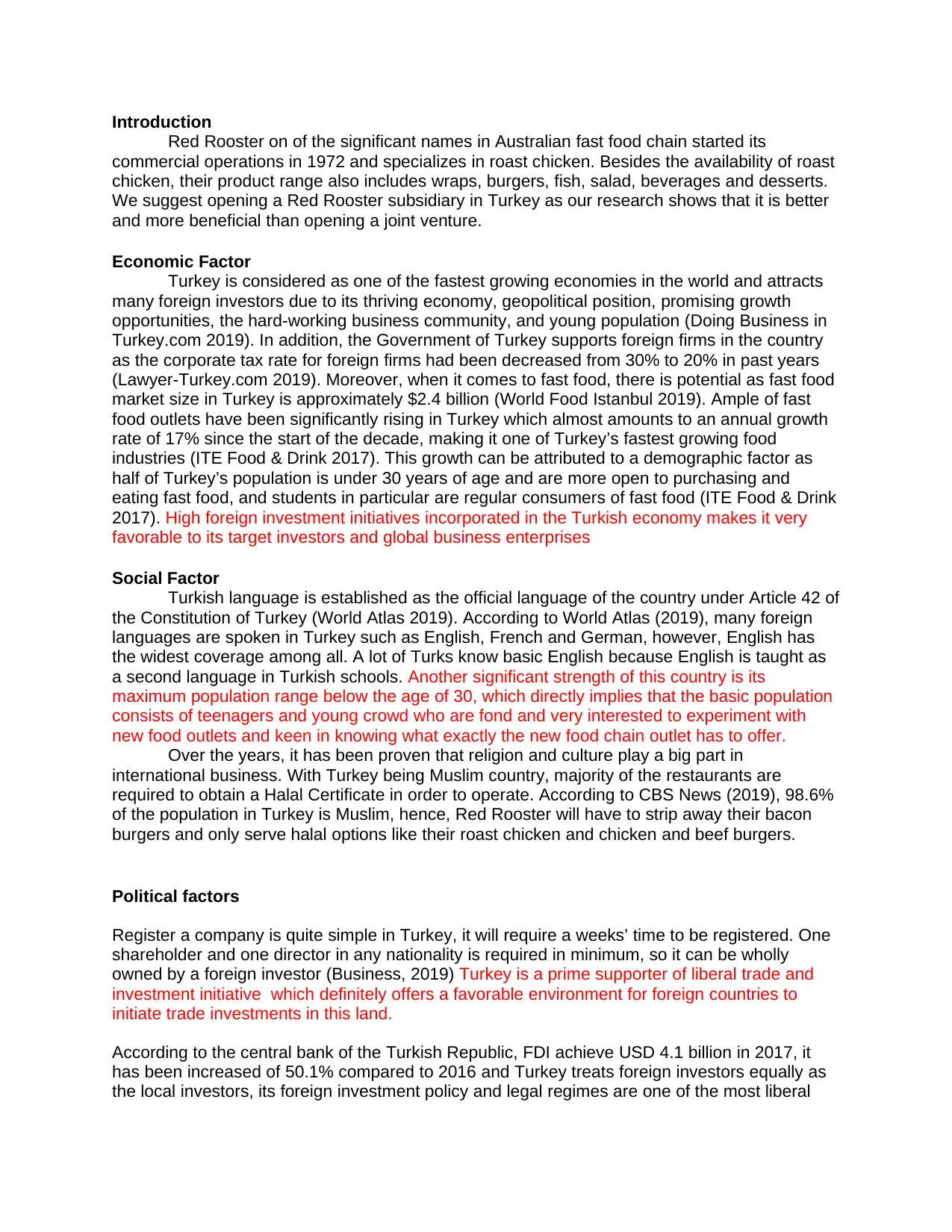
Introduction
Red Rooster on of the significant names in Australian fast food chain started its
commercial operations in 1972 and specializes in roast chicken. Besides the availability of roast
chicken, their product range also includes wraps, burgers, fish, salad, beverages and desserts.
We suggest opening a Red Rooster subsidiary in Turkey as our research shows that it is better
and more beneficial than opening a joint venture.
Economic Factor
Turkey is considered as one of the fastest growing economies in the world and attracts
many foreign investors due to its thriving economy, geopolitical position, promising growth
opportunities, the hard-working business community, and young population (Doing Business in
Turkey.com 2019). In addition, the Government of Turkey supports foreign firms in the country
as the corporate tax rate for foreign firms had been decreased from 30% to 20% in past years
(Lawyer-Turkey.com 2019). Moreover, when it comes to fast food, there is potential as fast food
market size in Turkey is approximately $2.4 billion (World Food Istanbul 2019). Ample of fast
food outlets have been significantly rising in Turkey which almost amounts to an annual growth
rate of 17% since the start of the decade, making it one of Turkey’s fastest growing food
industries (ITE Food & Drink 2017). This growth can be attributed to a demographic factor as
half of Turkey’s population is under 30 years of age and are more open to purchasing and
eating fast food, and students in particular are regular consumers of fast food (ITE Food & Drink
2017). High foreign investment initiatives incorporated in the Turkish economy makes it very
favorable to its target investors and global business enterprises
Social Factor
Turkish language is established as the official language of the country under Article 42 of
the Constitution of Turkey (World Atlas 2019). According to World Atlas (2019), many foreign
languages are spoken in Turkey such as English, French and German, however, English has
the widest coverage among all. A lot of Turks know basic English because English is taught as
a second language in Turkish schools. Another significant strength of this country is its
maximum population range below the age of 30, which directly implies that the basic population
consists of teenagers and young crowd who are fond and very interested to experiment with
new food outlets and keen in knowing what exactly the new food chain outlet has to offer.
Over the years, it has been proven that religion and culture play a big part in
international business. With Turkey being Muslim country, majority of the restaurants are
required to obtain a Halal Certificate in order to operate. According to CBS News (2019), 98.6%
of the population in Turkey is Muslim, hence, Red Rooster will have to strip away their bacon
burgers and only serve halal options like their roast chicken and chicken and beef burgers.
Political factors
Register a company is quite simple in Turkey, it will require a weeks’ time to be registered. One
shareholder and one director in any nationality is required in minimum, so it can be wholly
owned by a foreign investor (Business, 2019) Turkey is a prime supporter of liberal trade and
investment initiative which definitely offers a favorable environment for foreign countries to
initiate trade investments in this land.
According to the central bank of the Turkish Republic, FDI achieve USD 4.1 billion in 2017, it
has been increased of 50.1% compared to 2016 and Turkey treats foreign investors equally as
the local investors, its foreign investment policy and legal regimes are one of the most liberal
Red Rooster on of the significant names in Australian fast food chain started its
commercial operations in 1972 and specializes in roast chicken. Besides the availability of roast
chicken, their product range also includes wraps, burgers, fish, salad, beverages and desserts.
We suggest opening a Red Rooster subsidiary in Turkey as our research shows that it is better
and more beneficial than opening a joint venture.
Economic Factor
Turkey is considered as one of the fastest growing economies in the world and attracts
many foreign investors due to its thriving economy, geopolitical position, promising growth
opportunities, the hard-working business community, and young population (Doing Business in
Turkey.com 2019). In addition, the Government of Turkey supports foreign firms in the country
as the corporate tax rate for foreign firms had been decreased from 30% to 20% in past years
(Lawyer-Turkey.com 2019). Moreover, when it comes to fast food, there is potential as fast food
market size in Turkey is approximately $2.4 billion (World Food Istanbul 2019). Ample of fast
food outlets have been significantly rising in Turkey which almost amounts to an annual growth
rate of 17% since the start of the decade, making it one of Turkey’s fastest growing food
industries (ITE Food & Drink 2017). This growth can be attributed to a demographic factor as
half of Turkey’s population is under 30 years of age and are more open to purchasing and
eating fast food, and students in particular are regular consumers of fast food (ITE Food & Drink
2017). High foreign investment initiatives incorporated in the Turkish economy makes it very
favorable to its target investors and global business enterprises
Social Factor
Turkish language is established as the official language of the country under Article 42 of
the Constitution of Turkey (World Atlas 2019). According to World Atlas (2019), many foreign
languages are spoken in Turkey such as English, French and German, however, English has
the widest coverage among all. A lot of Turks know basic English because English is taught as
a second language in Turkish schools. Another significant strength of this country is its
maximum population range below the age of 30, which directly implies that the basic population
consists of teenagers and young crowd who are fond and very interested to experiment with
new food outlets and keen in knowing what exactly the new food chain outlet has to offer.
Over the years, it has been proven that religion and culture play a big part in
international business. With Turkey being Muslim country, majority of the restaurants are
required to obtain a Halal Certificate in order to operate. According to CBS News (2019), 98.6%
of the population in Turkey is Muslim, hence, Red Rooster will have to strip away their bacon
burgers and only serve halal options like their roast chicken and chicken and beef burgers.
Political factors
Register a company is quite simple in Turkey, it will require a weeks’ time to be registered. One
shareholder and one director in any nationality is required in minimum, so it can be wholly
owned by a foreign investor (Business, 2019) Turkey is a prime supporter of liberal trade and
investment initiative which definitely offers a favorable environment for foreign countries to
initiate trade investments in this land.
According to the central bank of the Turkish Republic, FDI achieve USD 4.1 billion in 2017, it
has been increased of 50.1% compared to 2016 and Turkey treats foreign investors equally as
the local investors, its foreign investment policy and legal regimes are one of the most liberal
Secure Best Marks with AI Grader
Need help grading? Try our AI Grader for instant feedback on your assignments.
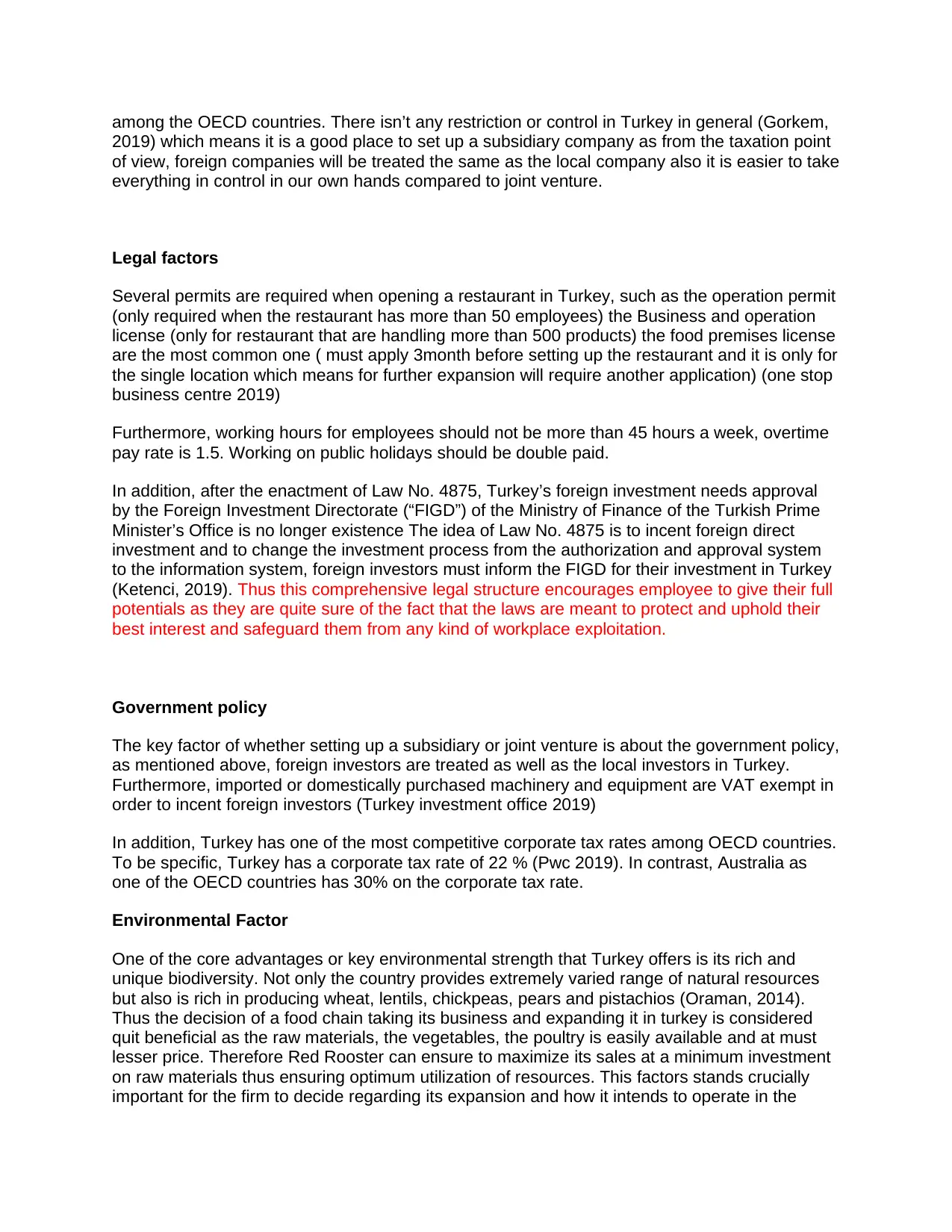
among the OECD countries. There isn’t any restriction or control in Turkey in general (Gorkem,
2019) which means it is a good place to set up a subsidiary company as from the taxation point
of view, foreign companies will be treated the same as the local company also it is easier to take
everything in control in our own hands compared to joint venture.
Legal factors
Several permits are required when opening a restaurant in Turkey, such as the operation permit
(only required when the restaurant has more than 50 employees) the Business and operation
license (only for restaurant that are handling more than 500 products) the food premises license
are the most common one ( must apply 3month before setting up the restaurant and it is only for
the single location which means for further expansion will require another application) (one stop
business centre 2019)
Furthermore, working hours for employees should not be more than 45 hours a week, overtime
pay rate is 1.5. Working on public holidays should be double paid.
In addition, after the enactment of Law No. 4875, Turkey’s foreign investment needs approval
by the Foreign Investment Directorate (“FIGD”) of the Ministry of Finance of the Turkish Prime
Minister’s Office is no longer existence The idea of Law No. 4875 is to incent foreign direct
investment and to change the investment process from the authorization and approval system
to the information system, foreign investors must inform the FIGD for their investment in Turkey
(Ketenci, 2019). Thus this comprehensive legal structure encourages employee to give their full
potentials as they are quite sure of the fact that the laws are meant to protect and uphold their
best interest and safeguard them from any kind of workplace exploitation.
Government policy
The key factor of whether setting up a subsidiary or joint venture is about the government policy,
as mentioned above, foreign investors are treated as well as the local investors in Turkey.
Furthermore, imported or domestically purchased machinery and equipment are VAT exempt in
order to incent foreign investors (Turkey investment office 2019)
In addition, Turkey has one of the most competitive corporate tax rates among OECD countries.
To be specific, Turkey has a corporate tax rate of 22 % (Pwc 2019). In contrast, Australia as
one of the OECD countries has 30% on the corporate tax rate.
Environmental Factor
One of the core advantages or key environmental strength that Turkey offers is its rich and
unique biodiversity. Not only the country provides extremely varied range of natural resources
but also is rich in producing wheat, lentils, chickpeas, pears and pistachios (Oraman, 2014).
Thus the decision of a food chain taking its business and expanding it in turkey is considered
quit beneficial as the raw materials, the vegetables, the poultry is easily available and at must
lesser price. Therefore Red Rooster can ensure to maximize its sales at a minimum investment
on raw materials thus ensuring optimum utilization of resources. This factors stands crucially
important for the firm to decide regarding its expansion and how it intends to operate in the
2019) which means it is a good place to set up a subsidiary company as from the taxation point
of view, foreign companies will be treated the same as the local company also it is easier to take
everything in control in our own hands compared to joint venture.
Legal factors
Several permits are required when opening a restaurant in Turkey, such as the operation permit
(only required when the restaurant has more than 50 employees) the Business and operation
license (only for restaurant that are handling more than 500 products) the food premises license
are the most common one ( must apply 3month before setting up the restaurant and it is only for
the single location which means for further expansion will require another application) (one stop
business centre 2019)
Furthermore, working hours for employees should not be more than 45 hours a week, overtime
pay rate is 1.5. Working on public holidays should be double paid.
In addition, after the enactment of Law No. 4875, Turkey’s foreign investment needs approval
by the Foreign Investment Directorate (“FIGD”) of the Ministry of Finance of the Turkish Prime
Minister’s Office is no longer existence The idea of Law No. 4875 is to incent foreign direct
investment and to change the investment process from the authorization and approval system
to the information system, foreign investors must inform the FIGD for their investment in Turkey
(Ketenci, 2019). Thus this comprehensive legal structure encourages employee to give their full
potentials as they are quite sure of the fact that the laws are meant to protect and uphold their
best interest and safeguard them from any kind of workplace exploitation.
Government policy
The key factor of whether setting up a subsidiary or joint venture is about the government policy,
as mentioned above, foreign investors are treated as well as the local investors in Turkey.
Furthermore, imported or domestically purchased machinery and equipment are VAT exempt in
order to incent foreign investors (Turkey investment office 2019)
In addition, Turkey has one of the most competitive corporate tax rates among OECD countries.
To be specific, Turkey has a corporate tax rate of 22 % (Pwc 2019). In contrast, Australia as
one of the OECD countries has 30% on the corporate tax rate.
Environmental Factor
One of the core advantages or key environmental strength that Turkey offers is its rich and
unique biodiversity. Not only the country provides extremely varied range of natural resources
but also is rich in producing wheat, lentils, chickpeas, pears and pistachios (Oraman, 2014).
Thus the decision of a food chain taking its business and expanding it in turkey is considered
quit beneficial as the raw materials, the vegetables, the poultry is easily available and at must
lesser price. Therefore Red Rooster can ensure to maximize its sales at a minimum investment
on raw materials thus ensuring optimum utilization of resources. This factors stands crucially
important for the firm to decide regarding its expansion and how it intends to operate in the
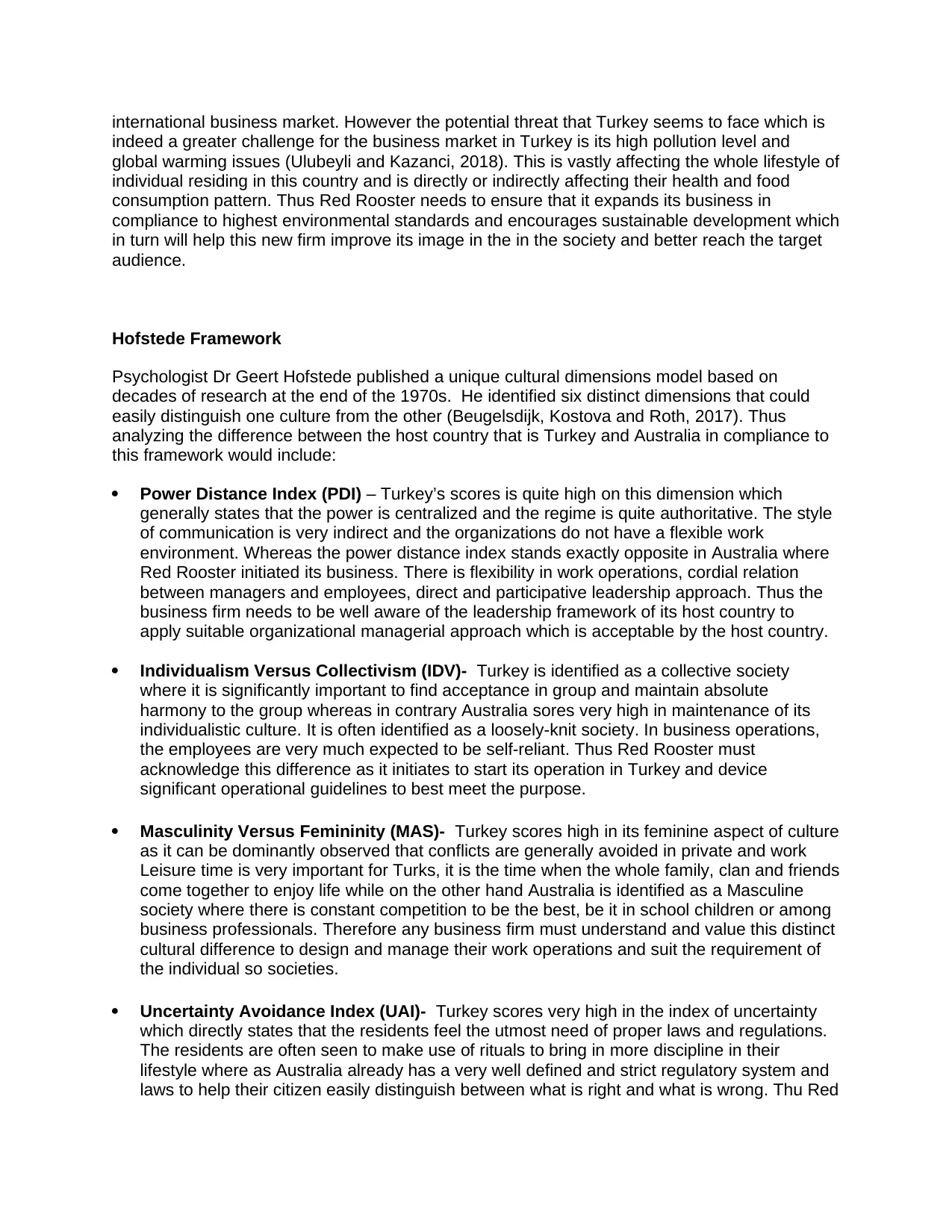
international business market. However the potential threat that Turkey seems to face which is
indeed a greater challenge for the business market in Turkey is its high pollution level and
global warming issues (Ulubeyli and Kazanci, 2018). This is vastly affecting the whole lifestyle of
individual residing in this country and is directly or indirectly affecting their health and food
consumption pattern. Thus Red Rooster needs to ensure that it expands its business in
compliance to highest environmental standards and encourages sustainable development which
in turn will help this new firm improve its image in the in the society and better reach the target
audience.
Hofstede Framework
Psychologist Dr Geert Hofstede published a unique cultural dimensions model based on
decades of research at the end of the 1970s. He identified six distinct dimensions that could
easily distinguish one culture from the other (Beugelsdijk, Kostova and Roth, 2017). Thus
analyzing the difference between the host country that is Turkey and Australia in compliance to
this framework would include:
Power Distance Index (PDI) – Turkey’s scores is quite high on this dimension which
generally states that the power is centralized and the regime is quite authoritative. The style
of communication is very indirect and the organizations do not have a flexible work
environment. Whereas the power distance index stands exactly opposite in Australia where
Red Rooster initiated its business. There is flexibility in work operations, cordial relation
between managers and employees, direct and participative leadership approach. Thus the
business firm needs to be well aware of the leadership framework of its host country to
apply suitable organizational managerial approach which is acceptable by the host country.
Individualism Versus Collectivism (IDV)- Turkey is identified as a collective society
where it is significantly important to find acceptance in group and maintain absolute
harmony to the group whereas in contrary Australia sores very high in maintenance of its
individualistic culture. It is often identified as a loosely-knit society. In business operations,
the employees are very much expected to be self-reliant. Thus Red Rooster must
acknowledge this difference as it initiates to start its operation in Turkey and device
significant operational guidelines to best meet the purpose.
Masculinity Versus Femininity (MAS)- Turkey scores high in its feminine aspect of culture
as it can be dominantly observed that conflicts are generally avoided in private and work
Leisure time is very important for Turks, it is the time when the whole family, clan and friends
come together to enjoy life while on the other hand Australia is identified as a Masculine
society where there is constant competition to be the best, be it in school children or among
business professionals. Therefore any business firm must understand and value this distinct
cultural difference to design and manage their work operations and suit the requirement of
the individual so societies.
Uncertainty Avoidance Index (UAI)- Turkey scores very high in the index of uncertainty
which directly states that the residents feel the utmost need of proper laws and regulations.
The residents are often seen to make use of rituals to bring in more discipline in their
lifestyle where as Australia already has a very well defined and strict regulatory system and
laws to help their citizen easily distinguish between what is right and what is wrong. Thu Red
indeed a greater challenge for the business market in Turkey is its high pollution level and
global warming issues (Ulubeyli and Kazanci, 2018). This is vastly affecting the whole lifestyle of
individual residing in this country and is directly or indirectly affecting their health and food
consumption pattern. Thus Red Rooster needs to ensure that it expands its business in
compliance to highest environmental standards and encourages sustainable development which
in turn will help this new firm improve its image in the in the society and better reach the target
audience.
Hofstede Framework
Psychologist Dr Geert Hofstede published a unique cultural dimensions model based on
decades of research at the end of the 1970s. He identified six distinct dimensions that could
easily distinguish one culture from the other (Beugelsdijk, Kostova and Roth, 2017). Thus
analyzing the difference between the host country that is Turkey and Australia in compliance to
this framework would include:
Power Distance Index (PDI) – Turkey’s scores is quite high on this dimension which
generally states that the power is centralized and the regime is quite authoritative. The style
of communication is very indirect and the organizations do not have a flexible work
environment. Whereas the power distance index stands exactly opposite in Australia where
Red Rooster initiated its business. There is flexibility in work operations, cordial relation
between managers and employees, direct and participative leadership approach. Thus the
business firm needs to be well aware of the leadership framework of its host country to
apply suitable organizational managerial approach which is acceptable by the host country.
Individualism Versus Collectivism (IDV)- Turkey is identified as a collective society
where it is significantly important to find acceptance in group and maintain absolute
harmony to the group whereas in contrary Australia sores very high in maintenance of its
individualistic culture. It is often identified as a loosely-knit society. In business operations,
the employees are very much expected to be self-reliant. Thus Red Rooster must
acknowledge this difference as it initiates to start its operation in Turkey and device
significant operational guidelines to best meet the purpose.
Masculinity Versus Femininity (MAS)- Turkey scores high in its feminine aspect of culture
as it can be dominantly observed that conflicts are generally avoided in private and work
Leisure time is very important for Turks, it is the time when the whole family, clan and friends
come together to enjoy life while on the other hand Australia is identified as a Masculine
society where there is constant competition to be the best, be it in school children or among
business professionals. Therefore any business firm must understand and value this distinct
cultural difference to design and manage their work operations and suit the requirement of
the individual so societies.
Uncertainty Avoidance Index (UAI)- Turkey scores very high in the index of uncertainty
which directly states that the residents feel the utmost need of proper laws and regulations.
The residents are often seen to make use of rituals to bring in more discipline in their
lifestyle where as Australia already has a very well defined and strict regulatory system and
laws to help their citizen easily distinguish between what is right and what is wrong. Thu Red
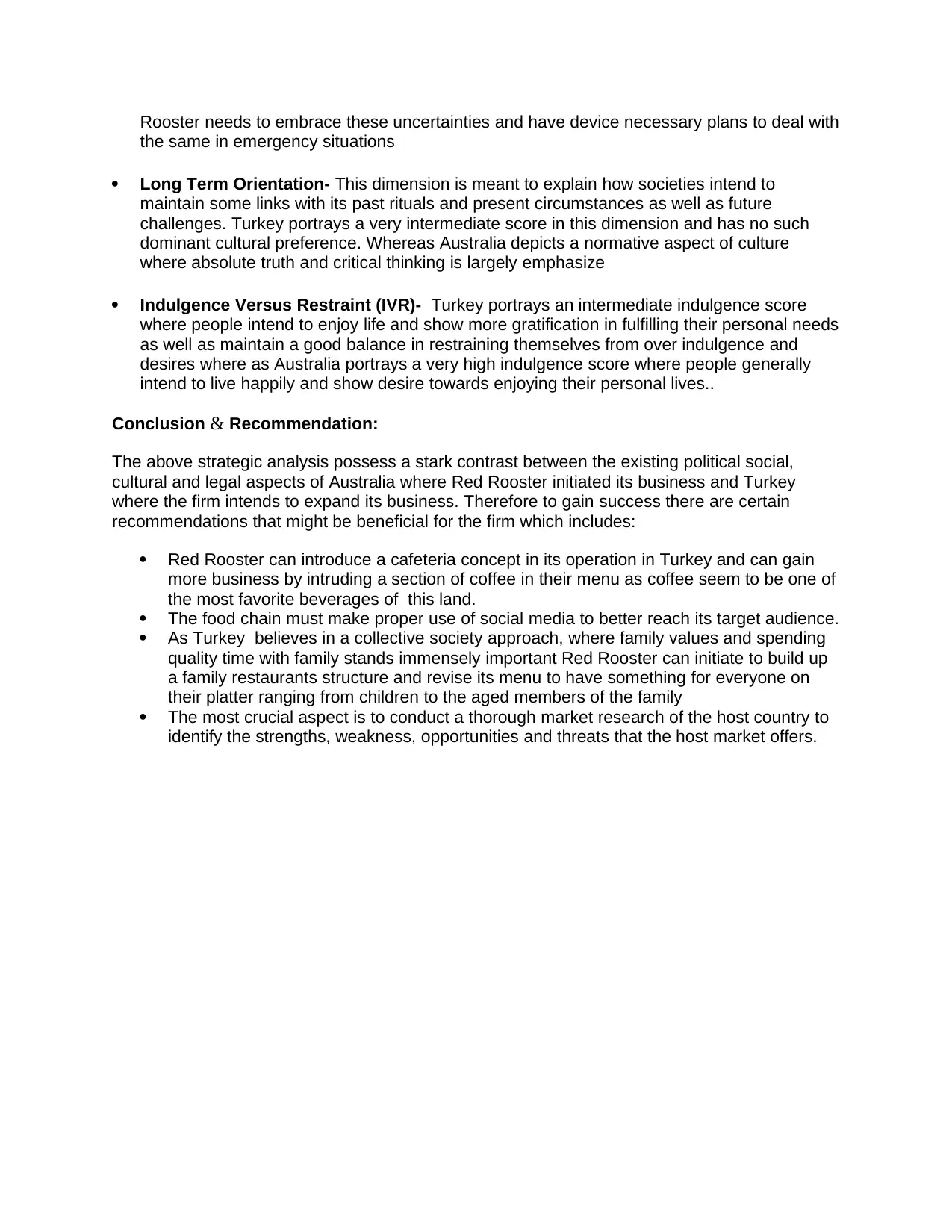
Rooster needs to embrace these uncertainties and have device necessary plans to deal with
the same in emergency situations
Long Term Orientation- This dimension is meant to explain how societies intend to
maintain some links with its past rituals and present circumstances as well as future
challenges. Turkey portrays a very intermediate score in this dimension and has no such
dominant cultural preference. Whereas Australia depicts a normative aspect of culture
where absolute truth and critical thinking is largely emphasize
Indulgence Versus Restraint (IVR)- Turkey portrays an intermediate indulgence score
where people intend to enjoy life and show more gratification in fulfilling their personal needs
as well as maintain a good balance in restraining themselves from over indulgence and
desires where as Australia portrays a very high indulgence score where people generally
intend to live happily and show desire towards enjoying their personal lives..
Conclusion & Recommendation:
The above strategic analysis possess a stark contrast between the existing political social,
cultural and legal aspects of Australia where Red Rooster initiated its business and Turkey
where the firm intends to expand its business. Therefore to gain success there are certain
recommendations that might be beneficial for the firm which includes:
Red Rooster can introduce a cafeteria concept in its operation in Turkey and can gain
more business by intruding a section of coffee in their menu as coffee seem to be one of
the most favorite beverages of this land.
The food chain must make proper use of social media to better reach its target audience.
As Turkey believes in a collective society approach, where family values and spending
quality time with family stands immensely important Red Rooster can initiate to build up
a family restaurants structure and revise its menu to have something for everyone on
their platter ranging from children to the aged members of the family
The most crucial aspect is to conduct a thorough market research of the host country to
identify the strengths, weakness, opportunities and threats that the host market offers.
the same in emergency situations
Long Term Orientation- This dimension is meant to explain how societies intend to
maintain some links with its past rituals and present circumstances as well as future
challenges. Turkey portrays a very intermediate score in this dimension and has no such
dominant cultural preference. Whereas Australia depicts a normative aspect of culture
where absolute truth and critical thinking is largely emphasize
Indulgence Versus Restraint (IVR)- Turkey portrays an intermediate indulgence score
where people intend to enjoy life and show more gratification in fulfilling their personal needs
as well as maintain a good balance in restraining themselves from over indulgence and
desires where as Australia portrays a very high indulgence score where people generally
intend to live happily and show desire towards enjoying their personal lives..
Conclusion & Recommendation:
The above strategic analysis possess a stark contrast between the existing political social,
cultural and legal aspects of Australia where Red Rooster initiated its business and Turkey
where the firm intends to expand its business. Therefore to gain success there are certain
recommendations that might be beneficial for the firm which includes:
Red Rooster can introduce a cafeteria concept in its operation in Turkey and can gain
more business by intruding a section of coffee in their menu as coffee seem to be one of
the most favorite beverages of this land.
The food chain must make proper use of social media to better reach its target audience.
As Turkey believes in a collective society approach, where family values and spending
quality time with family stands immensely important Red Rooster can initiate to build up
a family restaurants structure and revise its menu to have something for everyone on
their platter ranging from children to the aged members of the family
The most crucial aspect is to conduct a thorough market research of the host country to
identify the strengths, weakness, opportunities and threats that the host market offers.
Secure Best Marks with AI Grader
Need help grading? Try our AI Grader for instant feedback on your assignments.
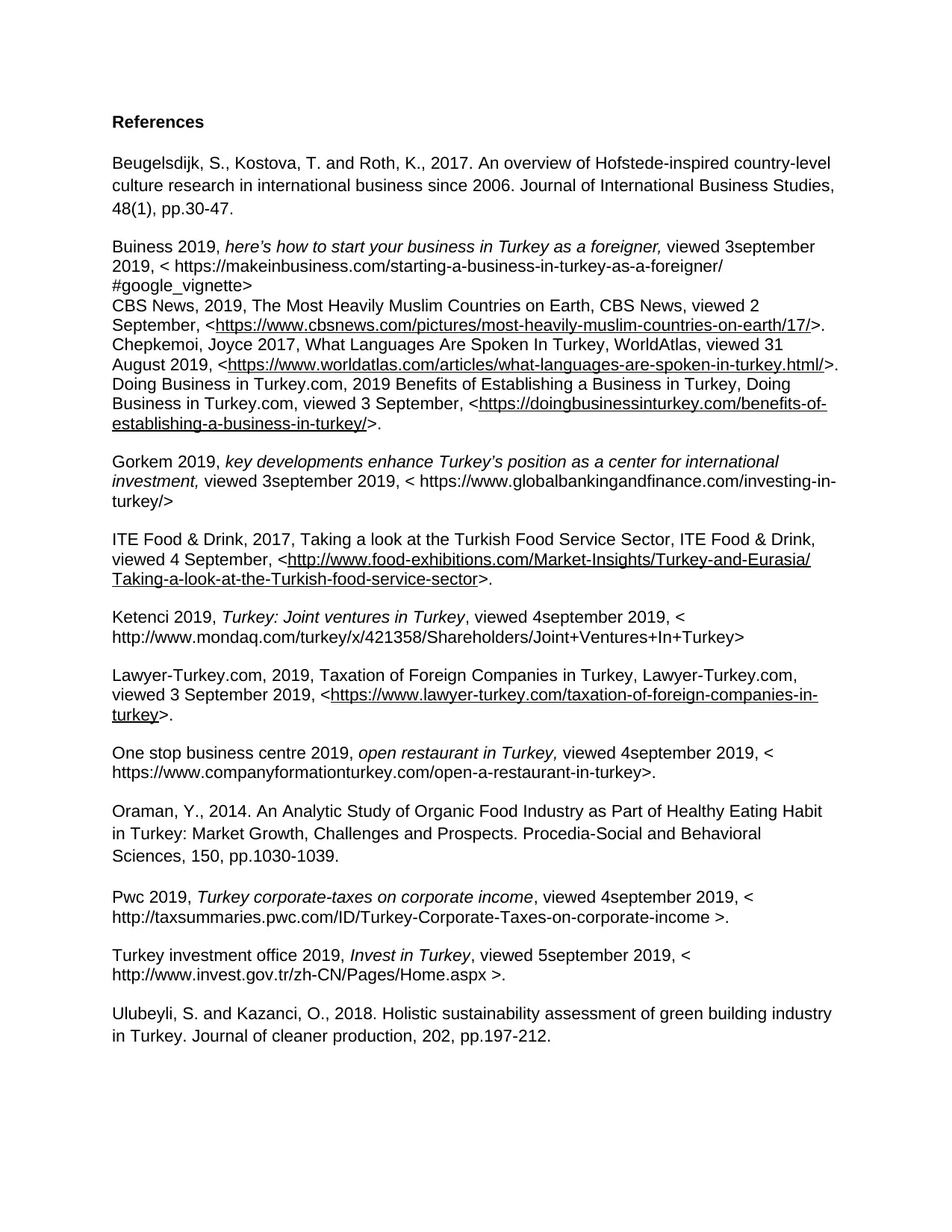
References
Beugelsdijk, S., Kostova, T. and Roth, K., 2017. An overview of Hofstede-inspired country-level
culture research in international business since 2006. Journal of International Business Studies,
48(1), pp.30-47.
Buiness 2019, here’s how to start your business in Turkey as a foreigner, viewed 3september
2019, < https://makeinbusiness.com/starting-a-business-in-turkey-as-a-foreigner/
#google_vignette>
CBS News, 2019, The Most Heavily Muslim Countries on Earth, CBS News, viewed 2
September, <https://www.cbsnews.com/pictures/most-heavily-muslim-countries-on-earth/17/>.
Chepkemoi, Joyce 2017, What Languages Are Spoken In Turkey, WorldAtlas, viewed 31
August 2019, <https://www.worldatlas.com/articles/what-languages-are-spoken-in-turkey.html/>.
Doing Business in Turkey.com, 2019 Benefits of Establishing a Business in Turkey, Doing
Business in Turkey.com, viewed 3 September, <https://doingbusinessinturkey.com/benefits-of-
establishing-a-business-in-turkey/>.
Gorkem 2019, key developments enhance Turkey’s position as a center for international
investment, viewed 3september 2019, < https://www.globalbankingandfinance.com/investing-in-
turkey/>
ITE Food & Drink, 2017, Taking a look at the Turkish Food Service Sector, ITE Food & Drink,
viewed 4 September, <http://www.food-exhibitions.com/Market-Insights/Turkey-and-Eurasia/
Taking-a-look-at-the-Turkish-food-service-sector>.
Ketenci 2019, Turkey: Joint ventures in Turkey, viewed 4september 2019, <
http://www.mondaq.com/turkey/x/421358/Shareholders/Joint+Ventures+In+Turkey>
Lawyer-Turkey.com, 2019, Taxation of Foreign Companies in Turkey, Lawyer-Turkey.com,
viewed 3 September 2019, <https://www.lawyer-turkey.com/taxation-of-foreign-companies-in-
turkey>.
One stop business centre 2019, open restaurant in Turkey, viewed 4september 2019, <
https://www.companyformationturkey.com/open-a-restaurant-in-turkey>.
Oraman, Y., 2014. An Analytic Study of Organic Food Industry as Part of Healthy Eating Habit
in Turkey: Market Growth, Challenges and Prospects. Procedia-Social and Behavioral
Sciences, 150, pp.1030-1039.
Pwc 2019, Turkey corporate-taxes on corporate income, viewed 4september 2019, <
http://taxsummaries.pwc.com/ID/Turkey-Corporate-Taxes-on-corporate-income >.
Turkey investment office 2019, Invest in Turkey, viewed 5september 2019, <
http://www.invest.gov.tr/zh-CN/Pages/Home.aspx >.
Ulubeyli, S. and Kazanci, O., 2018. Holistic sustainability assessment of green building industry
in Turkey. Journal of cleaner production, 202, pp.197-212.
Beugelsdijk, S., Kostova, T. and Roth, K., 2017. An overview of Hofstede-inspired country-level
culture research in international business since 2006. Journal of International Business Studies,
48(1), pp.30-47.
Buiness 2019, here’s how to start your business in Turkey as a foreigner, viewed 3september
2019, < https://makeinbusiness.com/starting-a-business-in-turkey-as-a-foreigner/
#google_vignette>
CBS News, 2019, The Most Heavily Muslim Countries on Earth, CBS News, viewed 2
September, <https://www.cbsnews.com/pictures/most-heavily-muslim-countries-on-earth/17/>.
Chepkemoi, Joyce 2017, What Languages Are Spoken In Turkey, WorldAtlas, viewed 31
August 2019, <https://www.worldatlas.com/articles/what-languages-are-spoken-in-turkey.html/>.
Doing Business in Turkey.com, 2019 Benefits of Establishing a Business in Turkey, Doing
Business in Turkey.com, viewed 3 September, <https://doingbusinessinturkey.com/benefits-of-
establishing-a-business-in-turkey/>.
Gorkem 2019, key developments enhance Turkey’s position as a center for international
investment, viewed 3september 2019, < https://www.globalbankingandfinance.com/investing-in-
turkey/>
ITE Food & Drink, 2017, Taking a look at the Turkish Food Service Sector, ITE Food & Drink,
viewed 4 September, <http://www.food-exhibitions.com/Market-Insights/Turkey-and-Eurasia/
Taking-a-look-at-the-Turkish-food-service-sector>.
Ketenci 2019, Turkey: Joint ventures in Turkey, viewed 4september 2019, <
http://www.mondaq.com/turkey/x/421358/Shareholders/Joint+Ventures+In+Turkey>
Lawyer-Turkey.com, 2019, Taxation of Foreign Companies in Turkey, Lawyer-Turkey.com,
viewed 3 September 2019, <https://www.lawyer-turkey.com/taxation-of-foreign-companies-in-
turkey>.
One stop business centre 2019, open restaurant in Turkey, viewed 4september 2019, <
https://www.companyformationturkey.com/open-a-restaurant-in-turkey>.
Oraman, Y., 2014. An Analytic Study of Organic Food Industry as Part of Healthy Eating Habit
in Turkey: Market Growth, Challenges and Prospects. Procedia-Social and Behavioral
Sciences, 150, pp.1030-1039.
Pwc 2019, Turkey corporate-taxes on corporate income, viewed 4september 2019, <
http://taxsummaries.pwc.com/ID/Turkey-Corporate-Taxes-on-corporate-income >.
Turkey investment office 2019, Invest in Turkey, viewed 5september 2019, <
http://www.invest.gov.tr/zh-CN/Pages/Home.aspx >.
Ulubeyli, S. and Kazanci, O., 2018. Holistic sustainability assessment of green building industry
in Turkey. Journal of cleaner production, 202, pp.197-212.
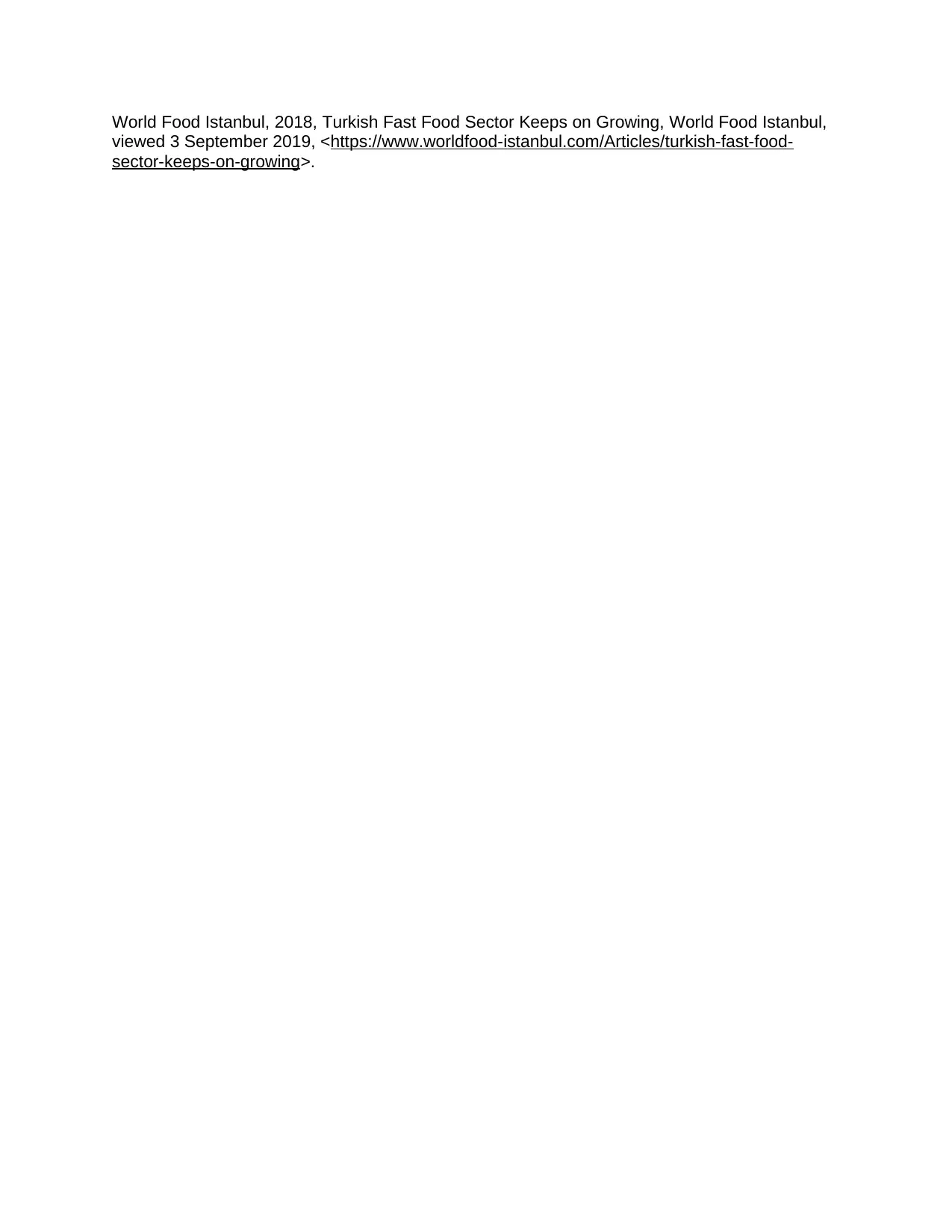
World Food Istanbul, 2018, Turkish Fast Food Sector Keeps on Growing, World Food Istanbul,
viewed 3 September 2019, <https://www.worldfood-istanbul.com/Articles/turkish-fast-food-
sector-keeps-on-growing>.
viewed 3 September 2019, <https://www.worldfood-istanbul.com/Articles/turkish-fast-food-
sector-keeps-on-growing>.
1 out of 6
Related Documents
Your All-in-One AI-Powered Toolkit for Academic Success.
+13062052269
info@desklib.com
Available 24*7 on WhatsApp / Email
![[object Object]](/_next/static/media/star-bottom.7253800d.svg)
Unlock your academic potential
© 2024 | Zucol Services PVT LTD | All rights reserved.


